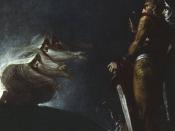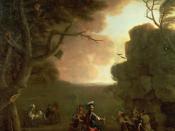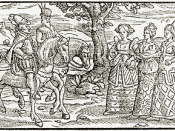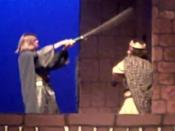A butcher is someone who brutally slaughters other human-beings. According to this definition Macbeth was a 'butcher' by the end of the play. Macbeth becoming a butcher was brought about by his ambition for power, and how this ambition was used by the witches.
Macbeth's ambition is made obvious from the start. It is the thing the witches use get him under their spell,'All hail thee Thane of Glamisâ¦.Thane of Cawdorâ¦..king'. Macbeth is intrigued by this greeting. When he finds out from Duncan that he has become the thane of Cawdor he whispers to the audience,'Glamis, and the thane of Cawdor, the greatest is behind.' Macbeth is sure that he will become king. However at this stage he thinks that he will acquire it legally as he sees murder as,'fantastical'(I,iii,139).
The story of how Macbeth descends into butchery starts when Duncan announces that Malcolm is to be,'Prince of Cumberland'(I,iv,39) and therefore Duncan's successor as king of Scotland.
Macbeth is now in a dilemma. He has just been told he will be king by the witches. Two of their prophesies have become true already. However, because Malcolm has just become king he cannot see how the third prophesy will come true.
Macbeth's wife solves his problem by telling him to kill Duncan. She tells him this after reading his letter to her and after hearing that the king is coming to her castle. She decides to'look like the innocent flower, but be the serpent under't.'(I,v,63-65).
Lady Macbeth plays an important part in Macbeth's spiral downwards into becoming a butcher by persuading him to commit his first murder. Macbeth doesn't want to kill Duncan and has strong doubts about what he should do, as shown by what he says in act I, scene vii,'He's in double trust hereâ¦..i am his kinsman strong against the deed , then as his host, who should against his murderer shut the door, not bear the knife himself' Lady Macbeth changes his mind by challenging his manhood,'When you durst do it, then you were a man' and, to be more than what you were, you would be so much more the man.'(I,vii,49-51) He finally decides, after much tossing and turning that killing Duncan would be the best thing,'I am settled'. What Duncan said after the Thane of Cawdor was executed that,'there's no art to find the mind's construction in the face'(I,iv,12-13) is proved when Macbeth says,'False face must hide what the false heart dost know'(I,iv,82-83) Macbeth shows much remorse about killing Duncan. Just before he kills Duncan he sees a dagger before him showing that his mind is so guilty it is playing tricks on him,'is this a dagger I see before me'. After he kills Duncan he hears recriminating voices,' Didst thou hear a noise?â¦â¦methought I heard a voice cry Sleep no more Macbeth does murder sleep- the innocent sleep'(II,ii,15+35-36) At this point in the play Macbeth regrets murdering Duncan and is afraid of getting caught.
However from this point there is only fear, terror and bloodshed in Scotland. It is not long before Macbeth decides to murder Banquo because Banquo confronts him with his crime,'thou hast it now;king, Cawdor, Glamis, all as the weird women promis'd; and, I fear, thou play'dst most foully for it'(III,i,1-3) He can't accept Banquo's suspicions/criticisms so he decides to kill him using the excuse that,'my genius is rebuk'd, as, it is said, Mark Antony was by Caesar.' Macbeth has already started to show the first signs of being a butcher and a tyrant.
Banqou's death is significant because it is initiated by Macbeth alone. He no longer needs Lady Macbeth to drive him. When Macbeth decides he will get Banquo murdered he is the one persuading the murderers to do it,'are you so gospell'd to pray good man and for his issue,whose heavy hand hath bow'd you to the grave and beggar'd yours forever?'(III,i,89-91) In addition, he is now hiring others to do his dirty work.
It also seems that he is convincing himself as well as the murderers, that Banquo should be murdered,'Know Banquo is your enemy⦠so he is mine ; and in such bloody distance that every minute of his being thrusts against my near'st life.'(III,i,115-118) Not long after his conversation with the murderers he has convinced himself that he is on the right track. From here his butchery is unrestrained.
The third murder shows that Macbeth has really become a tyrant as he decides to kill Macduff because he 'denies his person at our great bidding'(III,iv,127-128) His resolution to continue on his path of bloodshed is demonstrated when he says,'all causes shall give way, I am in blood stepp'd in too far, that should I wade no more, returning would be as tedious'(III,iv,136-137) This more than anything wlse in the play shows that Macbeth has become a tyrant in that he is willing to do anything to further himself and this includes killing Macduff's 'wife, his babies, and any unfortunate souls that trace him in his line'(IV,i,153-154).
The meeting he has with the witches just before he decides to massacre Macduff's family clarifies how blind he has become and how dependant he is on the witches for advice. He goes to them seeking advice and when he comes out of the meeting he says,'infected be the air whereon they ride and damn'd all those who trust them!'(IV,i,138-139) Yet he is trusting them and they have ruined Macbeth's life. He has lost the relationship he had with his wife and any respect, love or honour that used to be given to him,'my way of life has fallen into sereâ¦and that which should accompany old age, as honour, love, obedience, troops of friends, I must not look to have ; but, in their stead, curses..,mouth-honour and breathâ¦'(V,iii,23-26) When the final battle nears, Macbeth seems to have injected himself with the fresh batch of Hubris the witches gave him during their meeting with him. Even though he is told ten thousand soldiers march on him he says'our castle's strength will laugh a siege to scorn'(V,v,2-3). This hubris stays with him until Macduff tells him that he was'untimely ripp'd' from his mother's womb, meaning that he was not born of a woman (or near enough) and Macbeth can be killed by him. At this point Macbeth realises the treachery of the ambiguous truths he has been told by the witches,'and be these juggling fiends no more believ'd'(V,vii,48) The question that has to be answered is that if someone commits an act of butchey, does that make them a butcher? The answer to this is yes- even though Macbeth only really committed one act of butchery(killing the Macduffs) he showed no signs of improving. At the end he was becoming worse. When the end battle was nearing he told his servant to,'skirr the country round; Hang those that talk of fear'(V,iii,35-36) He trusted the witches because they told him what he wanted to hear even though he said anyone who trusted them was stupid .
Macbeth was a butcher because he murdered innocents, who, according to the witches threatened his succession and his reign as king. He killed Duncan because he wanted to be king, he murdered Banqou because his issue were going to rule after him and he murdered Macduff's family to teach him a lesson. Macbeth was more of a butcher because he assassinated his victims rather than killing them on the battlefield (as the Thane of Cawdor had tried to do)





